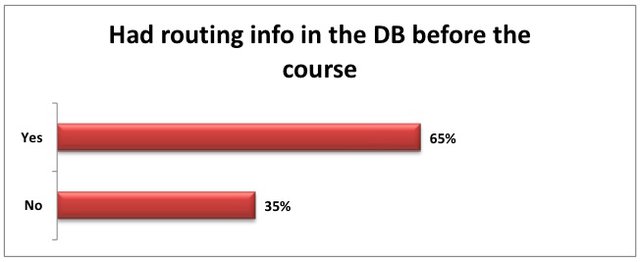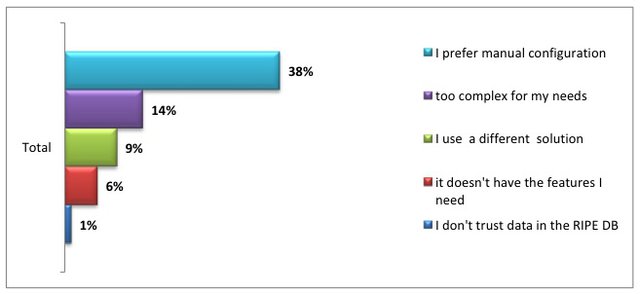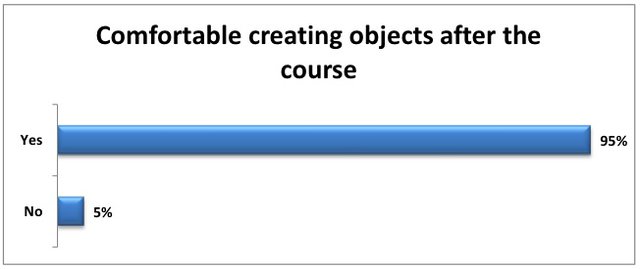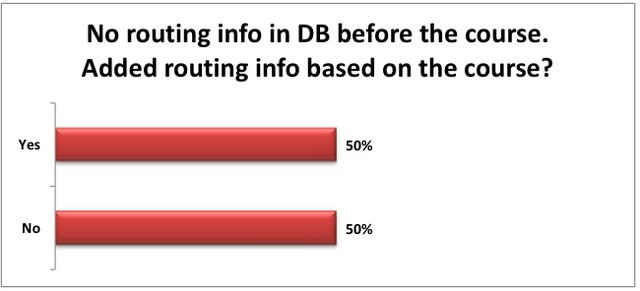In 2009-2010, the RIPE NCC conducted a survey among the participants of its Routing Registry Training Course to find out how they used the Routing Registry and how effective the course was.
The survey results show that 65% of the respondents have their routing information registered in the RIPE Database. The objective of the survey was primarily to find ways to improve the course and to encourage the use of the Routing Registry.
The results were initially intended for internal use of the RIPE NCC only. However, we decided to publish them as we felt the results were interesting for a wider audience.
Participants of 18 Routing Registry Training Courses, covering a period of 12 months, were invited to fill out an online questionnaire. 86 participants completed the survey (that is 26% of all participants).
The Internet Routing Registry (IRR)
The Internet Routing Registry (IRR) ensures the stability and consistency of the Internet-wide routing by sharing information between network operators. In addition to making Internet topology visible, the IRR is used by network operators to look up peering agreements, determine optimal policies, and more recently, to configure their routers.
Some of the main reasons why an LIRs should document their routing policy in the IRR include:
- Required by some transit providers
- Required by some exchange points (IXPs)
- Allows peers to automatically update their filters
- Ensures consistent information between neighbours
- Good housekeeping
Survey Results
It appears that a majority of the respondents (65%) already have their routing information documented in the Routing Registry. (See Figure 1).

Figure 1: Routing information in the RIPE Database prior to the course
However only 19% configure their routers with scripts based on the information in the RIPE Database and only 26% are currently using the IRRToolset.
According to the participants there are several reasons for not using the IRRToolset. Some don't have AS numbers or have very simple setups.
The largest group of respondents stated that they prefer manual configuration (38%) as shown in Figure 2 below.

Figure 2: Reasons for not using the IRRToolSet
After many years of discussions with LIRs during the courses, we think it’s safe to assume that the preference for manual configuration is caused by a number of reasons that are not directly related to the Routing Registry and the IRRToolset itself:
- Keeping full control of their routing policy
- Keeping a competitive advantage within their organisation
- The reluctance to use free and open-source software
It was encouraging to see that 95% of those surveyed said that the training course made them feel more comfortable creating and updating objects in the RIPE Database (see Figure 3 below).

Figure 3: Participants feel more comfortable using the Routing Registry after the course
Additionally, half of the respondents who didn’t have routing information in the RIPE Database prior to the course have since added it based on what they learnt in the course (see Figure 4 below).

Figure 4: More participants added routing information to the Routing Registry after the course
The Routing Registry Training Course
The Routing Registry Training Course is an introductory hands-on course for RIPE NCC members (LIRs). It covers the IRR, specifically the RIPE Database, Routing Policy Specification Language (RPSL) and related tools (IRRToolset and specifically RtConfig).
It is a hands-on course with exercises and practice sessions. After taking the course, participants will know how to:
- Register their routing information in the RIPE Database
- Describe their routing policy with RPSL
- Understand the need for filtering
- Create prefix filters based on policy information
- Automate the configuration of their routers with the IRRToolset
- Create objects in the RIPE Database
For more information, please refer to the full survey results . The results of this survey will be used to rewrite the Routing Registry Training Course.


Comments 0
The comments section is closed for articles published more than a year ago. If you'd like to inform us of any issues, please contact us.